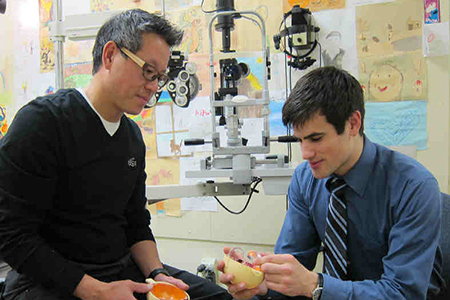Engineering isn’t just for stereotypical geeks or nerds like Howard Wolowitz on “The Big Bang Theory.” Engineers are developing the next generation of mobile technology and creating new tools to help save the environment and new medical devices to help save lives. They are always in demand and work in almost every industry. Engineering majors also have the highest reported overall median starting salary at the bachelor’s level: $62,535* for 2013 graduates.
Where can engineering take you?
Examples of engineering are everywhere in our daily lives says Dr. Manos Maragakis, Engineering Dean for the University of Nevada Reno. “From the cars you drive to the roads you drive on to the smartphones you use to the air we breathe and the water we drink. All of this is engineering.”
Dr. W. L. Scheller II, Head of the Industrial and Manufacturing Engineering Department at Kettering University (MI) says engineers are needed almost everywhere. “In addition to positions in manufacturing industrial engineers are found in hospitals shipping and logistics companies (think UPS) banks government military and airlines.”
Paving the way for a future in engineering
You can probably guess that taking math and science in high school is crucial to prepare for an engineering degree.
“Students should take four years of math so they will be ready to start an engineering program as college freshmen,” recommends Ryan Smith, student advisor for the University of Alaska Fairbanks College of Engineering and Mines. Smith suggests tackling AP calculus and chemistry to help you prepare.
Successful engineers need more than just technical knowledge—good communication skills are also key.
“Engineers almost always work in teams with other people—often non-engineers. Participation in team activities is important so that prospective students will learn how to get along with others and focus on accomplishing a task,” Scheller says.
Dr. Charles Reinholz chair of Embry-Riddle Aeronautical University’s (FL) Department of Mechanical Engineering says high school students need a healthy curiosity about how things work and should be involved in hands-on projects such as designing fabricating and maintaining real machines. “Computer programming computer-aided drafting (CAD) and basic electronics are all valuable skills in pursuing an engineering degree.”
Nick Bertozzi dean of Daniel Webster College’s (NH) School of Engineering and Computer Science agrees. He recommends taking a combination of AP classes and hands-on courses in machining welding or CAD.
Moving outside the classroom
To find out if engineering is for you “try it on for size” before you graduate high school.
“While internships and part-time jobs are great there are other ways to gain experience,” says Greg Denon, Director of the Career Center at Wentworth Institute of Technology (MA). Denon advises high school students to look at student competitions such as FIRST Robotics a national program that combines hands-on learning with college mentors.
Other universities offer summer engineering programs. Embry-Riddle offers aerospace and robotics summer camps says Deborah Bandy director of admissions operations at the university.
There are other ways to prepare for this hands-on career—like networking. “It never hurts to contact a local engineering professional organization … to see if they have any volunteers who will let you shadow them for a day or a week,” says Cathy Pieronek, Assistant Dean for Academic Affairs and Director of the Women’s Engineering Program at the University of Notre Dame (IN).
Check to see if your high school is a Project Lead the Way participant too. “Project Lead the Way is a pre-engineering curriculum that involves a series of courses where you learn introductory engineering concepts apply them and build things,” says Bertozzi.
Smith advises another route. “The most effective ways to learn about the different engineering fields are either by visiting and touring an engineering college or by going to job fairs and talking to the different companies on hand,” he says.
Credits, Internships and Program Options
Once enrolled in your institution of choice there are many opportunities to get out of the classroom while still earning college credits. Notre Dame engineering students tackle internships to prepare for the real world. “This benefits our students because they get to ‘interview’ a company over a 10- to 12-week period and the company gets to see more of what the student can do than can be determined in a short interview,” Pieronek says.
There are options beyond internships as well. Many engineering colleges offer co-op programs where students get an opportunity to receive school credit and a letter grade for paid work in their field of study. Co-op students gain up to two years of work experience on their résumés!
During your co-op semesters you’ll get to apply classroom theory and obtain professional work experience says Fred Driscoll, Dean of the College of Engineering and Technology at Wentworth.
At Daniel Webster College engineering design courses are team-taught by engineering and humanities professors to ensure you gain important communication skills and ethics that employers want. “Students are graded on the technical content and a professional in communication grades them on the communication aspects. The number one indicator for success is your ability to communicate even in engineering,” Bertozzi says.
To advance in your career and make really big bucks some engineering disciplines require you to have a master’s degree. Several schools such as the University of Alaska Fairbanks’ mechanical engineering program and almost all engineering programs at Georgia Tech have special bachelor’s/master’s program options where you can finish both degrees in only five years. At Kettering select students can take two courses during their final term that count for both degrees—reducing the time it takes to complete a master’s degree by one term.
Tomorrow’s engineering trends
So where exactly is engineering headed?
“Engineering has many hot areas,” Reinholz says. “Three-dimensional printing is creating a revolution in design and manufacturing. Small embedded computers are enabling a new generation of smaller more capable robotic and assistive devices. Clean renewable sources of energy are [needed to help solve] pressing problems with significant technical social and political ramifications … Other hot areas include cybersecurity medical devices and environmental monitoring and protection.”
Smith adds, “Work with bio-fuel or electric vehicles is a growing field right now.” The lab-based University of Alaska Fairbanks gives its students hands-on experiences in this area through the Eco-marathon competition in which student teams from around the world design build and test ultra-energy-efficient vehicles.
“Our B.S. in plastics engineering is one of only two in the country,” says Adam Kramschuster, Program Director for Plastics Engineering at University of Wisconsin—Stout. “The program emphasizes hands-on laboratory activities and student engineering design projects with a particular focus on plastics materials and processing.”
“We’re also seeing a trend toward sustainable technologies,” adds Kramschuster. “This includes R&D for alternative renewable energy solutions (like wind turbines solar batteries and energy storage) safe disposal systems and reusable materials (plastics paper [and] packaging materials). There’s also [a move toward] globalization a need for engineers with abilities to communicate and work effectively in diverse and international environments.”
Consider some of the hot new products in your life too—engineers may be responsible for many of them. In one ongoing applied research project at Kettering the school’s engineering department is investigating how gestures can be used to control machinery. “Gestures include the sweeping motion to go to the next picture on an iPad,” Scheller explains.
Scheller also says industrial engineering continues to be a hot area. “Under the Affordable Care Act industrial engineers are needed to control costs and quality of care. Both are critical for hospitals to make money.”
Biomedical mechanical and electrical engineering job prospects are growing as well. Matt McLendon director of communications at the Georgia Institute of Technology says, “Engineers at Georgia Tech have worked on a variety of diverse programs including ‘smart skin’ technology providing remote monitoring of infrastructure.”
Sure there are lots of options for an engineering major but what are the odds of getting a job once you have your degree in hand? With this major pretty good. All of the schools mentioned here report that most of their graduates are already employed. In fact President Obama invited engineers and professors to a White House event to discuss doubling the number of engineers over the next decade. In 2011 several companies nationwide committed to doubling the number of engineering internships they offer so you’ll be better prepared for your first job after college.
Know your options
If you think engineering is for you take the next step: Visit schools and talk to the professors and students at each about where your interests might best fit. Learn about their research as you conduct yours. If you have the skills and interest to become an engineer you’ll not only help people improve their lives but also earn some of the highest starting salaries of any college graduates.
*Source: National Association of Colleges and Employers April 2013 Salary Survey (median starting salary)
Scott William is a freelance writer in Fort Lauderdale, Fla.



